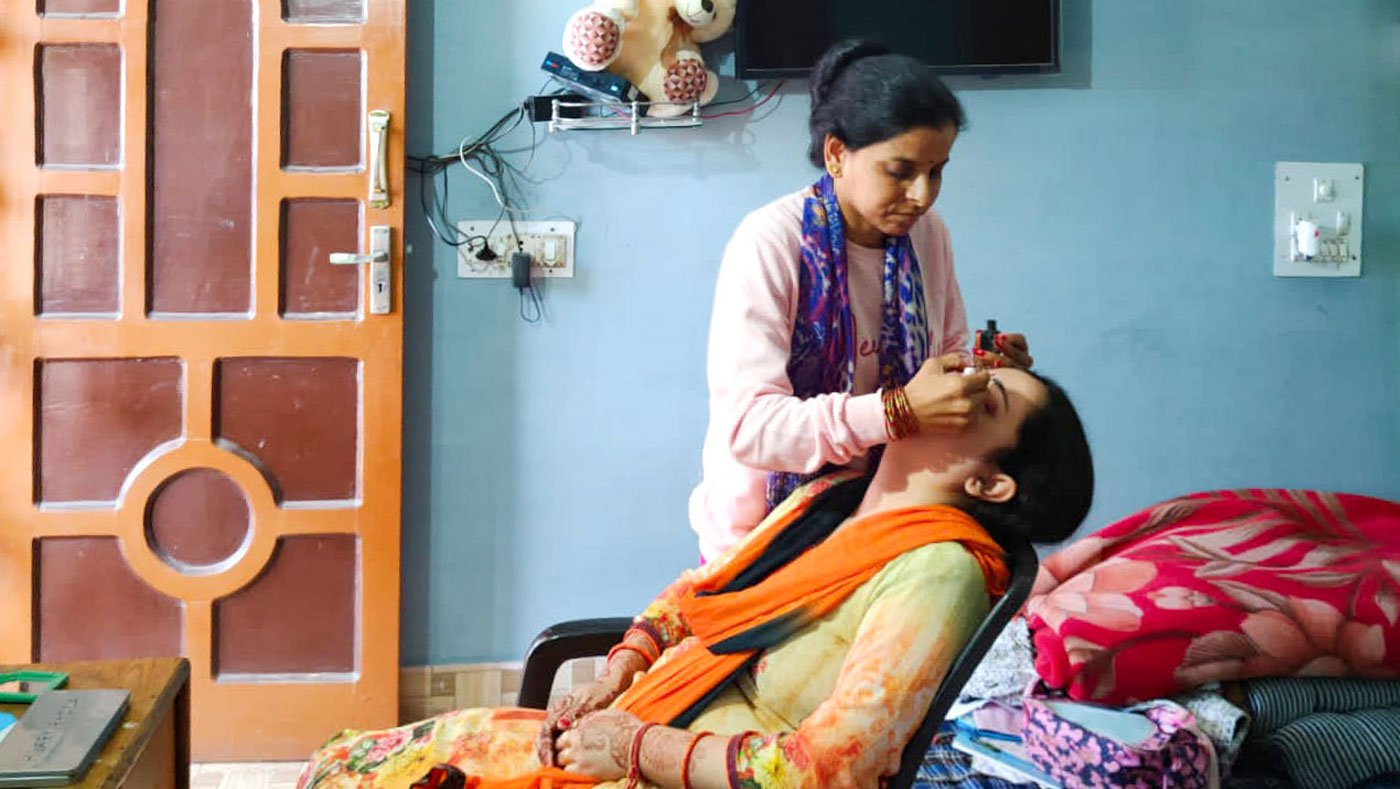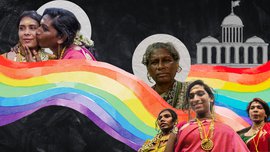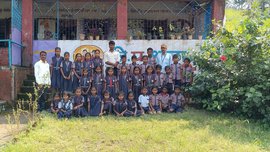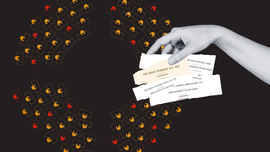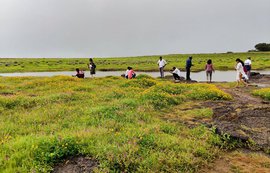Renu Thakur is hard at work, deftly using thin thread to pluck the eyebrows of her customer. “All college girls from Kamlehar get their eyebrows shaped by me,” says the beauty entrepreneur from Kamlehar village.
“This is the most difficult task in make-up.” She is applying a thin layer of foundation on her customer Jyoti’s face, stroking the brush around her eyes. “This cream will make the skin smooth so that the make-up has a better glow,” says the 32-year-old.
Renu has been in the beauty industry for 11 years, starting when she was 21. “I had thought of learning beauty parlour work since my childhood. I really like this field and wanted to learn it right from the time I was a little girl.” When she was 16, she went to Delhi, where her father was working at the time, to spend her vacation. There, she learnt about a six-month make-up course for Rs. 3,000. “I decided to do the course because no one in my village did that,” says the beauty entrepreneur.

Renu Thakur (left) has been in the beauty business for 11 years, starting when she was 21. Applying a thin layer of foundation on her customer Jyoti’s face (right), Renu strokes the brush around her eyes. 'This cream will make the skin smooth so that the make-up has a better glow,' she says
After her marriage at 21, Renu told her husband, Amit Thakur, about wanting to start a beauty parlour and he readily agreed. But her in-laws opposed it. “Will you wear the pallu in the village or do your work?” they would say referring to the custom where young brides must cover their head and stay out of the public gaze. But for Renu, the display of her skills at her convenience was important.
To open her shop, she had secured a loan of Rs. 45,000 nine years ago at an interest rate of 1 per cent from Punjab National Bank in Draman village of Kangra district. However, despite her best efforts she says, “I’ve been unable to repay the loan and it has now increased to 60,000 rupees.”
Renu earns between Rs. 200 to Rs. 300 a day but it depends on the number of customers that come in. “I charge 30 rupees for threading eyebrows. For eyebrow threading plus upper lip hair removal, I charge 40.” The earnings go up significantly when Renu is called for a bridal makeover – then she earns around Rs. 3,000 a day. If the bride owns the required make-up products, Renu charges only Rs. 1,000 for the makeover. “Some days I earn nothing,” she says.

Renu procures her make-up supplies from Palampur. 'It takes about half an hour to get there by bus,' she says


The beauty entrepreneur has been carrying out work from her own home since the covid-19 lockdown. Hers is the only woman-run business in her neighbourhood
Her shop in the village, with a population of 393 (Census 2011), was always bustling with customers. “Business was good,” she says until covid-19 struck and “my husband shut down my shop. He feared that we might get infected with the virus.” Since then, Renu has been carrying out her work from her own home.
With many parlours springing in the neighbourhood, Renu has seen a decline in customers. Eight years ago, there wasn’t a single beauty parlour in Kamlehar when Renu started her business. “Now there are many more beauty parlours in the village,” she says.
Kamlehar’s neighbourhood is full of shops run by men and Renu’s is the only woman-run business in the region, well equipped with all the products required for everything from a haircut to mehendi , waxing, facial and make-up. To procure her make-up supplies for the parlour, Renu takes a bus to Palampur. She buys the supplies from a wholesaler in bulk to avail cheaper rates.
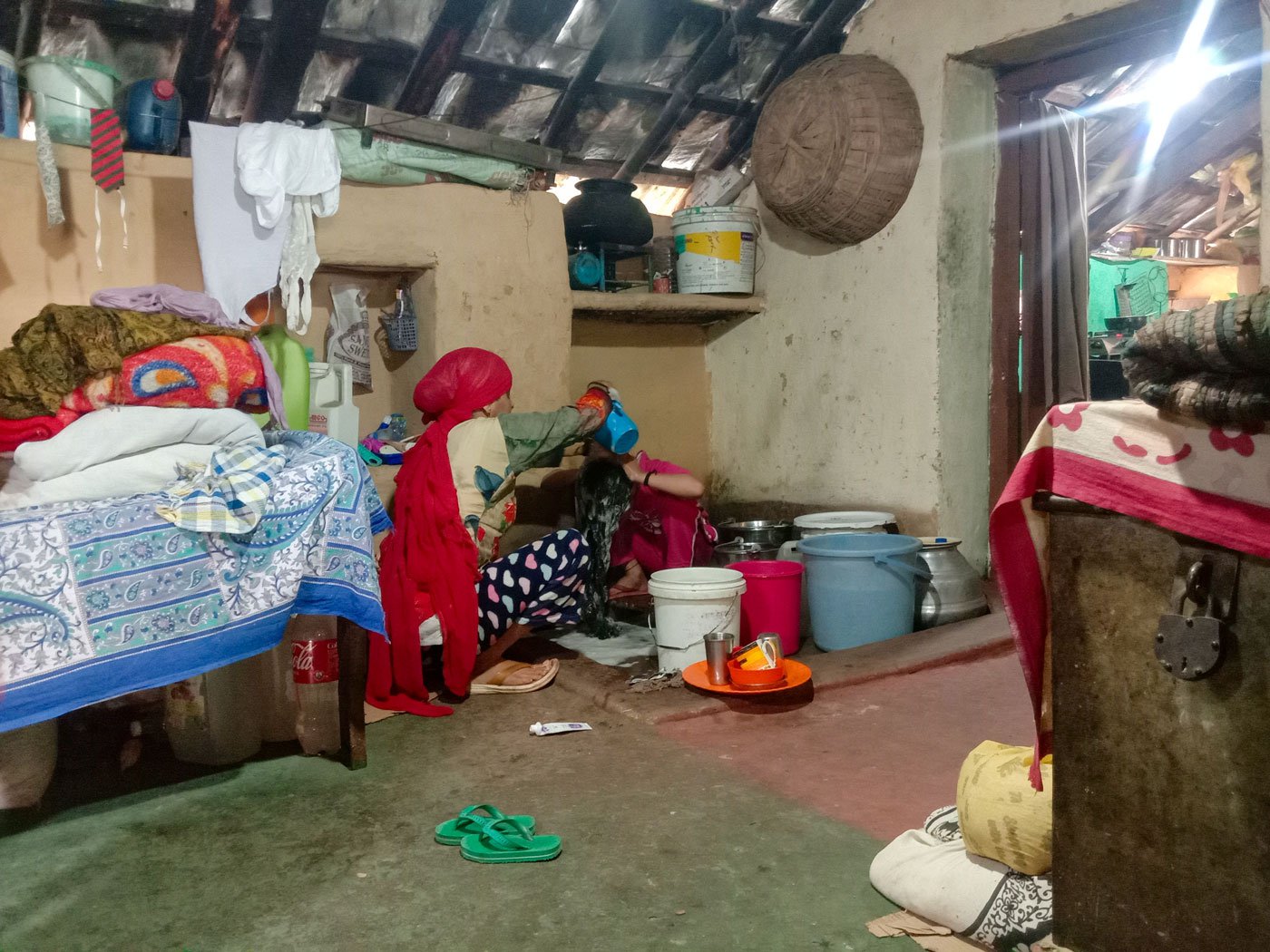
Renu’s elder daughter Riddhima, 10, is in class 6. Her younger daughter Smaira is three and stays at home with her mother. With the income from her beauty parlour business, Renu pays Riddhima’s school fees
Being fluent in Hindi as well as Pahari – languages spoken in the neighbouring villages – Renu easily chats with her customers who come from as far as the Nanahar and Rachhiara villages, located almost a kilometre away from her village.
Renu’s husband, Amit, runs a chicken shop and is a driver. Renu’s elder daughter Riddhima, 10, is in class 6. Her younger daughter Smaira is three and stays at home with her mother. With the income from her beauty parlour business, Renu pays Riddhima’s school fees.
Renu is happy to see women from her village not being confined to household chores. “Women [here] are creating their own space and their families are also being supportive,” she says. These are women who knit, farm, and run small businesses like her to earn a living. “I hope more women do it,” she says.
Our thanks to Parveen Kumar, Amrita Rajput and Naomi Fargose, former PARI interns, for helping with this piece.